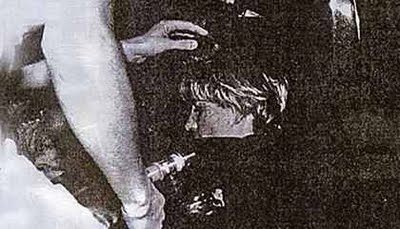In 2011, Keith Allen made a documentary supporting the conspiracy theories that surround the deaths of Diana, Princess of Wales and Dodi Fayed. This film continues to be banned in the UK and the US in an astonishing victory of censorship over freedom of expression. But why?
Anyone who knows me will know that I am staunchly anti-censorship. I don’t like to see any film banned or edited. It tramples all over the filmmaker’s freedom of expression, and our freedom to enjoy or learn from what they produce – and I’m yet to see any worthwhile justification for doing it. More often than not, it’s the censors stepping in to impose subjective moral judgements about sex, violence and religion on us all.
What’s different about Unlawful Killing – the 2011 documentary made by Keith Allen – is that apparently the BBFC refused the film a certificate on the grounds of ‘defamation’.
But let’s start with what the film’s actually about…
The film’s main claim – Princess Diana was murdered by the Royals
Unlawful Killing hones in on the conspiracy theories surrounding the 1997 car crash in Paris, which tragically killed Diana, Princess of Wales and Dodi Fayed. Its focus is on the 2007 inquest and its failure to properly address the arguments and the unanswered questions that have led people to formulate conspiracy theories in the first place.
The continuing mystery of the white Fiat Uno. The “biologically inexplicable” blood test results from the autopsy of Diana’s driver, Henri Paul. The lack of any working CCTV cameras in the tunnel where the crash happened. Diana’s handwritten letter, predicting her death in a car crash, which was concealed by the authorities.

It’s a good film. Not a great one, but a good one. It makes some intriguing points, raises valid questions and interviews a few interesting people, including friends of Diana and a lawyer from the inquest. But as the same time as it accuses the 2007 inquest of being one-sided and biased, Unlawful Killing could be accused of the very same thing.
In one drawn-out section, Allen and various others bang on about how the monarchy is a terrible thing for the country and an inordinate waste of money. The film also spends its time on several interviews that were probably unnecessary to the point of the film. These include a clinical psychologist called Oliver James, who gives a rather ludicrous “professional diagnosis” of Prince Philip and calls him a psychopath.
It’s this interview which is at the very centre of the film’s troubles.
Defamation? Really?
Reportedly the BBFC were insisting on 87 cuts before they could give Unlawful Killing a certificate, to stay within the UK’s libel laws. Defamation is all about saying things which damage a person’s reputation without proper cause or proof of wrongdoing. I’m no expert in defamation law, but if this is the true reason we still can’t buy a legal copy of Unlawful Killing in this country, it highlights some major problems with the law.
Yes, the film says some outrageous things. It calls the Royal Family “bloody racists” and “gangsters in tiaras”, and Oliver James compares Prince Philip to Fred West. But defamation should be about whether untrue statements actually harm a person in some way. I don’t really think Prince Philip’s life is going to be turned upside down by some psychologist he’s never met calling him a psychopath.
And the funny thing is, new defamation laws came into force in 2014. These laws raise the threshold for causing harm with defaming statements, and expand the public interest defence. Surely Unlawful Killing will sail past the censors now?
Well, it’s still banned. In the UK because of the BBFC. In the US because film companies might face lawsuits through their UK offices. We still can’t watch (legally anyway) a documentary that, for the most part, gives an insightful look into the Princess Diana conspiracy theories.
Here’s a conspiracy theory for you: the defamation excuses are just a cover. It’s the Establishment – the British Royal Family – who are blocking this film. After all, are there not many, many examples of perfectly legal and available films which say defaming and potentially untrue things about real people? What’s so different about Unlawful Killing?
Perhaps it’s that Keith Allen is publicly highlighting a conspiracy theory the Royals desperately want to go away…
Next week: a monster washed up on the beach?

I know this is an old article, but it’s still worth pointing out this film was not banned by the BBFC. It wasn’t the BBFC who required 87 cuts, it was lawyers who were asked to consult for the producers. It never got submitted to the BBFC. It’s not banned, the producers decided not to release it for fear of prosecution due to the number of laws they would have broken by releasing it.
LikeLike
You’re right, Jim. Thank you for clarifying! Some articles have mentioned the BBFC insisting on the cuts, but I just found an article from Keith Allen himself mentioning that it was British lawyers insisting on them. Still, it’s akin to banning. Self-censorship is still censorship.
LikeLike
Is this documentary available to watch anywhere?
LikeLike
Not that I’m aware of unfortunately. I had to download it.
LikeLike